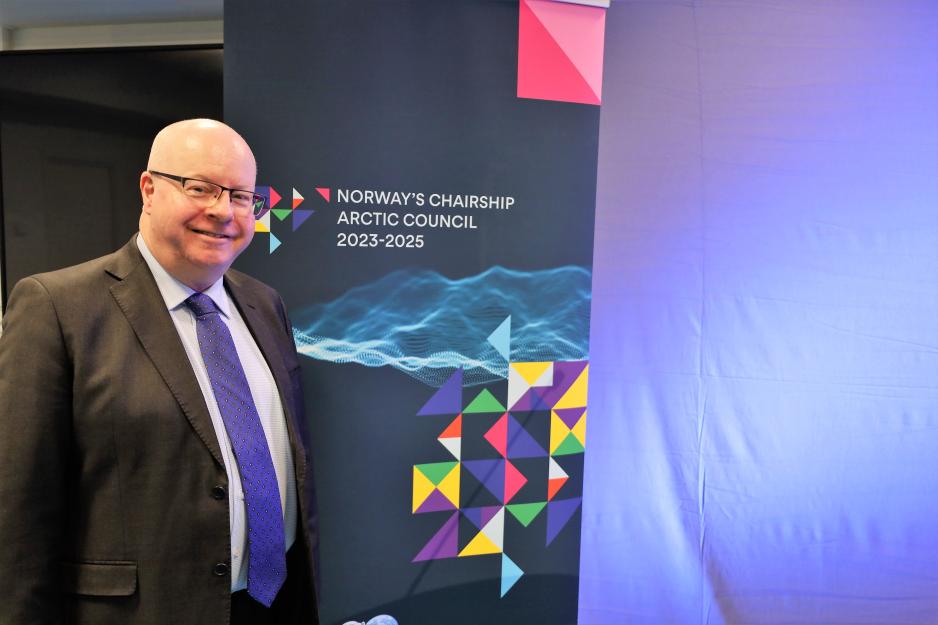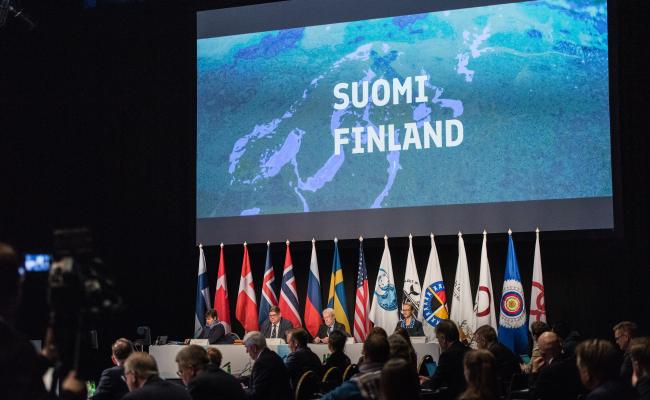Open Letter to the Arctic Council: Clean Arctic Alliance Recommendations for the Norway Chair of the Arctic Council

Morten Høglund is Norway's ambassador for the Arctic and represents Norway in the Arctic Council as a senior Arctic Arctic Official. (Photo: Hilde Bye / High North News).
During Norway’s two-year Chairmanship of the Arctic Council, the Clean Arctic Alliance calls on Norway to focus on the safeguarding of the Arctic environment and sustainable development in the Arctic, with a special emphasis on new measures for mitigating the impacts of Arctic shipping, which will minimise emissions of greenhouse gas emissions, including black carbon and methane, pollution discharges, reduce the risk of oil spills, and address underwater radiated noise.
These themes provide Norway with the opportunity to provide global leadership for a region of the world already experiencing extreme temperature changes year-round, record low summer sea ice extent and the opening of Arctic sea routes earlier in the year.
As Norway embarks on its term as Chair we should all remind ourselves of the words of the UN Secretary-General from last year (2022):
“We are on a fast track to climate disaster. Major cities underwater, unprecedented heatwaves, terrifying storms, widespread water shortages. The extinction of a million species of plants and animals. This is not fiction or exaggeration. It is what science tells us from our current energy policies.”
Nowhere are these impacts being felt more strongly than in the Arctic. The latest Intergovernmental Panel on Climate Change Assessment Report - the 6th of its kind - concluded that:
Norway’s priorities and actions during its leadership of the Arctic Council between 2023 and 2025 will be critical to the future health of the Arctic Ocean.
“The likelihood and impact of abrupt and / or irreversible changes in the climate system, including changes triggered when tipping points are reached, increase with further global warming. And as warming levels increase, so do the risks of species extinction or irreversible loss of biodiversity in ecosystems including forests, coral reefs and in Arctic regions.”
Norway’s priorities and actions during its leadership of the Arctic Council between 2023 and 2025 will be critical to the future health of the Arctic Ocean. The time to act is now, and the Clean Arctic Alliance urges Norway to:
Protect the ARCTIC ENVIRONMENT by:
- Promote the development of a zero-emission vision for Arctic shipping and support the development of a corresponding road-map leading to zero emissions - moving from oil based fuels to cleaner alternative non-fossil fuels and the necessary on-shore infrastructure to achieve the vision
- Encouraging all Arctic nations to adopt the International Maritime Organization’s (IMO) resolution MEPC.342(77) which calls for using distillate or cleaner alternative fuels in or near the Arctic.
- Implement the Arctic heavy fuel oil (HFO) ban for ships operating in Arctic waters by 1 January 2024, by eliminating the use of any waivers or other loopholes which would allow HFO to be used beyond that date.
- Call for the banning of Exhaust Gas Cleaning Systems (EGCS), ‘scrubbers’, and discharge of scrubber wash water in the Arctic.
- Support the adoption at MEPC 80 of the IMO’s revised underwater radiated noise reduction guidelines and encourage the IMO to develop Arctic-specific recommendations alongside mandatory measures to ensure underwater radiated noise is significantly reduced in the Arctic this decade.
- Strengthen regulations on sewage discharges and develop Arctic wide regulations on the discharge of greywater.
- Promote further reduction of shipping’s impacts on priority Arctic ecosystems and species through marine spatial planning, vessel re-routing, speed reductions, designation of low impact shipping corridors, and shipping-free areas.
Promote CLIMATE AND GREEN ENERGY SOLUTIONS by:
- Call for mandatory measures at the IMO to reduce and eliminate black carbon emissions from shipping in and near the Arctic through an amendment to MARPOL Annex VI or similar means.
- Encourage Arctic states to continue to implement and fulfil their commitments to reduce black carbon emissions by 25 – 33% by 2025 (based on 2013 levels) and establish an immediate and ambitious process to update these targets beyond 2025 based on 1.5 degree warming pathways and the latest science and Indigenous Knowledge.
- Support short-term measures to reduce greenhouse gas emissions from Arctic shipping, and in particular measures to reduce ship speed, installation of wind assist technology, and increased energy efficiency measures.
Support PEOPLE IN THE ARCTIC by:
- Supporting Indigenous communities to protect their livelihoods and resources through a reduction of black carbon emissions, which would slow down snow and ice melt; and the implementation of a strong HFO ban which would protect subsistence resources, such as fishing and hunting, that are essential for the food security and cultural identity of Arctic Indigenous peoples.
- Promoting efforts to ensure a just and equitable transition which directly supports Arctic Indigenous communities moving to cleaner alternative non-fossil fuels, and making greater use of renewable energy (e.g. solar and wind power, battery storage technology) to accompany a ban on the use and carriage of HFO by ships in Arctic waters.
Develop a STRONGER ARCTIC COUNCIL by:
- Recognising and agreeing on actions to address the lack of trained emergency responders as well as search, rescue and response equipment capacity in the event of an Arctic oil spill.
- Recognising and agreeing on actions that address the lack of comprehensive and consistent weather monitoring in large areas of the Arctic, which creates risks for vessel operators and places the burden of risk on Indigenous people, local communities, wildlife, and the marine environment
- Supporting and strengthening cooperation among Arctic nations to collaboratively respond to shipping accidents, including oil and chemical spills.
- Exploring ways on further using marine spatial planning by the Arctic Countries as well as in areas beyond national jurisdiction.
About the Clean Arctic Alliance
Made up of 20 not-for-profit organisations, the Clean Arctic Alliance campaigns to persuade governments to take action to protect the Arctic, its wildlife and its people.
Members include: The Altai Project, Alaska Wilderness League, Bellona, Clean Air Task Force, Green Transition Denmark, Ecology and Development Foundation ECODES, Environmental Investigation Agency, Friends of the Earth US, Global Choices, Greenpeace, Iceland Nature Conservation Association, International Cryosphere Climate Initiative, Nature And Biodiversity Conservation Union, Ocean Conservancy, Pacific Environment, Seas At Risk, Surfrider Foundation Europe, Stand.Earth, Transport & Environment and WWF.


